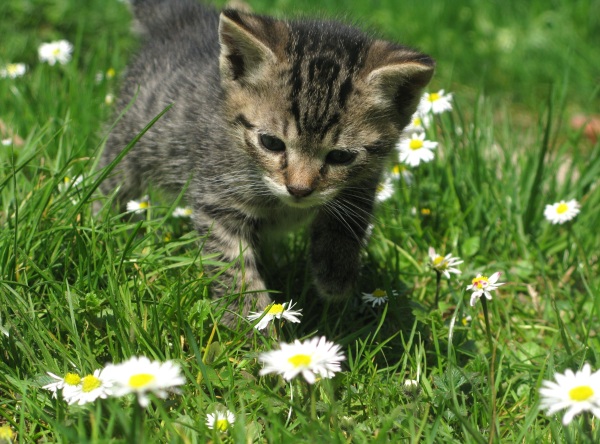As I hear more and more (many not-so-positive) veterinary opinions about Hill’s new Prescription Diet y/d Feline Thyroid Health, I felt it only fair to ask Hill’s some questions about their new prescription cat food. A week later, and I’m still waiting for a response.
If you haven’t heard, Hill’s Science Diet has released a new prescription cat food. Veterinarian Dr. Jean Hofve writes “Hill’s Pet Nutrition has just released “y/d,” a thyroid diet for cats, in whom there is a growing epidemic of hyperthyroidism. While Hill’s admits that there is no scientific evidence that excess iodine causes hyperthyroidism in cats (in fact, their staff veterinarian stated that if iodine were actually the problem, every cat would be hyperthyroid!), they nevertheless claim that this diet, fed exclusively, will normalize a cat’s thyroid levels in 3 weeks. The diet has been tested for nutritional adequacy by feeding trial in approximately 14 cats; some cats ate the food for 1-2 years. Because most hyperthyroid cats are older, and many older cats also have some degree of kidney impairment, y/d is said to be “kidney friendly” with reduced phosphorus and sodium levels.” (Dr. Hofve has more to say on this diet, click here to read her entire post)
Hill’s told DVM360.com “Managing hyperthyroidism is now as easy as feeding your cat,” says Dru Forrester, DVM, MS, Dipl. ACVIM, director of Scientific & Technical Communication for Hill’s Pet Nutrition at CVC in Kansas City today.
The new diet manages iodine intake to control thyroid hormone production, and there’s no pilling necessary, Hill’s reports.
The product helps restore thyroid health by reducing T4 hormone production, and it helps support kidney health by controlling phosphorus and sodium. The product is also said to help support urinary tract health through reduced magnesium and moderate urine pH target (6.4 – 6.6).
Hill’s Prescription Diet y/d Feline Thyroid Health contains limited iodine levels to effectively improve thyroid health in three weeks. The product is available in a dry 4-lb. and 8.5-lb. bags, and canned formulations.”
The Dry y/d Feline Thyroid Diet contains…
“Corn Gluten Meal, Animal Fat (preserved with mixed tocopherols and citric acid), Whole Grain Corn, Soybean Mill Run, Dried Egg Product, L-Lysine, Chicken Liver Flavor, Potassium Citrate, Lactic Acid, Dicalcium Phosphate, vitamins (L-Ascorbyl-2-Polyphosphate (source of vitamin C), Vitamin E Supplement, Niacin, Thiamine Mononitrate, Vitamin A Supplement, Calcium Pantothenate, Riboflavin, Biotin, Vitamin B12 Supplement, Pyridoxine Hydrochloride, Folic Acid, Vitamin D3 Supplement), Fish Oil, Choline Chloride, Calcium Carbonate, Calcium Sulfate, DL-Methionine, Taurine, Vitamin E Supplement, L-Tryptophan, Natural Flavor, minerals (Ferrous Sulfate, Zinc Oxide, Copper Sulfate, Manganous Sulfate), L-Carnitine, preserved with Mixed Tocopherols and Citric Acid, Phosphoric Acid, Beta-Carotene, Rosemary Extract.”
In other words – no meat.
The Can y/d Feline Thyroid Diet contains…
“Water, Liver, Meat by-products, Chicken, Whole Grain Corn, Rice Flour, Chicken Fat (preserved with mixed tocopherols and citric acid), Chicken Liver Flavor, Powdered Cellulose, Calcium Carbonate, Fish Oil, Dried Yeast, Potassium Chloride, L-Lysine, DL-Methionine, Guar Gum, Vitamin E Supplement, Taurine, Choline Chloride, Salt, L-Cysteine, Thiamine Mononitrate, L-Carnitine, Dicalcium Phosphate, Ferrous Sulfate, Zinc Oxide, Ascorbic Acid (source of vitamin C), Niacin, Copper Sulfate, Manganous Sulfate, Pyridoxine Hydrochloride, Beta-Carotine, Calcium Pantothenate, Vitamin B12 Supplement, Riboflavin, Biotin, Vitamin D3 Supplement, Folic Acid.”
I’ve been hearing some ‘stuff’ from the various veterinarians that are friends of this website regarding this new cat food. From the information I have heard, I felt it only fair to ask Hill’s Science Diet directly a few questions.
The following questions were sent to Hill’s via their website on 9/6/11…
Exactly how many cats were tested on this diet before its release? What was the length of time cats were fed this diet (shortest time, longest time)?
Some veterinarians are saying you rushed the product to market without proper research, comments?
Why are there significant differences in amount of animal protein amounts in the dry food versus the can food?
It has been mentioned to me that Hill’s is encouraging practicing veterinarians to participate in extended studies of this food in real world situations – specifically to study the food on actual patients. Is this true? If so, is Hill’s paying for lab work needed on these patients? Will the pet owner be advised their pet is participating in this study?
One week later…no response from Hill’s. Should they respond, I will post their reply here.
Wishing you and your pet(s) the best,
Susan Thixton
Pet Food Safety Advocate
Author, Buyer Beware
Co-Author Dinner PAWsible
TruthaboutPetFood.com
PetsumerReport.com
What’s in Your Pet’s Food?
Is your dog or cat eating risk ingredients? Chinese imports? Petsumer Report tells the ‘rest of the story’ on over 2500 cat foods, dog foods, and pet treats. 30 Day Satisfaction Guarantee. www.PetsumerReport.com
Are you subscribed to Truth About Pet Food Newsletter? Click Here to subscribe
Follow Truth about Pet Food on Twitter
Become a Fan of Truth about Pet Food, Dinner PAWsible, Buyer Beware on Facebook
Find Healthy Pet Foods in Your Area Click Here


























